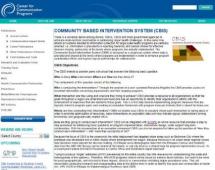Community Based Intervention System
The Community Based Intervention System (CBIS) is designed as a reciprocal system where data are provided and shared at the levels where programs are implemented in order to enhance program coordination efforts and expose logical partnerships for collaboration. The CBIS intends to provide users with a tool that answers the following basic question: Who is doing what intervention, where, and how are they doing it?
CBIS provides a base map from which layers can be added to allow users to visualize interventions in relation to any existing morbidity data. Additionally, program information is maintained by the organization conducting the intervention rather than by a disinterested third party or data collector.
Source: Johns Hopkins University Center for Communication Programs
Date of Publication: March 25, 2019
SIMILIAR RESOURCES
Tools
Examples
- A Guide to WHO’s Guidance on COVID-19
- Guidance for Including People with Disabilities in Response to the COVID-19 Pandemic
- Practical Guidance for Risk Communication and Community Engagement (RCCE) for Refugees, Internally Displaced Persons (IDPs), Migrants, and Host Communities Particularly Vulnerable to COVID-19 Pandemic
- Identifying & Mitigating Gender-based Violence Risks within the COVID-19 Response
- COVID-19: Resources to Address Gender-based Violence Risks
- Tailoring Malaria Interventions in the COVID-19 Response
- Early Estimates of the Indirect Effects of the COVID-19 Pandemic on Maternal and Child Mortality in Low-income and Middle-income Countries: a Modelling Study
- Who Self-Cares Wins
- Gender-based Violence Prevention, Risk Mitigation and Response during COVID-19
- Compassion in a Time of COVID-19

